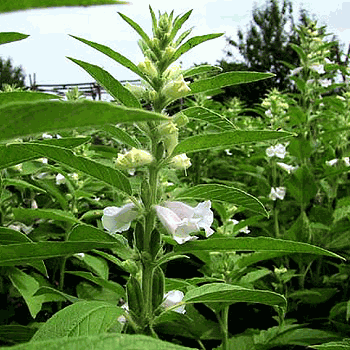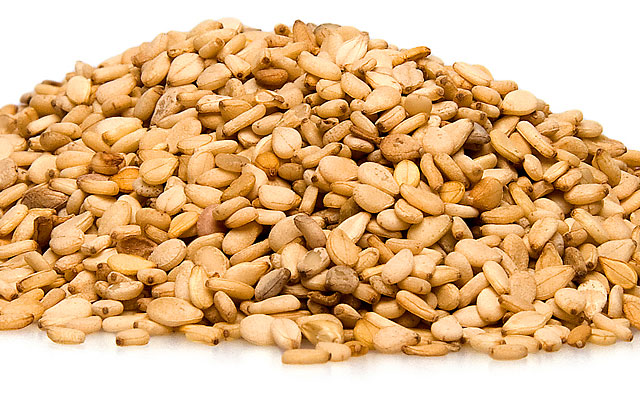- One of the first oil seeds known to humankind, sesame seeds have been widely employed in culinary as well as traditional medicines for their nutritive, preventive, and curative properties. Sesame are an important sources of phyto-nutrients such as omega-6 fatty acids, flavonoid phenolic antioxidants, vitamins, and dietary fiber with potential anti-cancer as well as health promoting properties.
- Sesame plant is a tall annual herb in the Pedaliaceae family, which grows extensively in Asia, particularly in Burma, China, and India. It is also one of the chief commercial crops in Nigeria, Sudan and Ethiopia.
- Sesame seeds are small, almost oblate in shape. Toasted seeds feature pleasant, nutty flavoror.
Contents
Benefits
- Flavorful, crunchy sesame seeds are widely considered healthy foods. 100 g of seeds carry 573 calories. Although, much of its calorie comes from fats, sesame contains several notable health-benefiting nutrients, minerals, antioxidants and vitamins that are essential for wellness.
- The seeds are especially rich in mono-unsaturated fatty acid, oleic acid, which comprises up to 50% fatty acids in them. Oleic acid helps lower LDL or “bad cholesterol” and increases HDL or “good cholesterol” in the blood. Research studies suggest that Mediterranean diet which is rich in mono-unsaturated fats help prevent coronary artery disease, and stroke by favoring healthy lipid profile.
- The seeds are also very valuable sources of dietary protein with fine quality Amino acids that are essential for growth, especially in children. Just 100 g of seeds provide about 18 g of protein (32% of daily-recommended values).
- In addition, sesame seeds contain many health benefiting compounds such as sesamol (3, 4-methylene-dioxyphenol), sesaminol, furyl-methanthiol, guajacol (2-methoxyphenol), phenylethanthiol and furaneol, vinylguacol, and decadienal. Sesamol and sesaminol are phenolic anti-oxidants. Together, these compounds help stave off harmful free radicals from the human body.
- Sesame is among the seeds rich in quality vitamins, and minerals. They are very good sources of B-complex vitamins such as niacin, folic acid, thiamine (vitamin B1), pyridoxine (vitamin B6), and Vitamin B2(riboflavin).
- 100 g of sesame contains 97 µg of folic acid, about 25% of recommended daily intake. Folic acid is essential for DNA synthesis. When given to expectant mothers during their peri-conception period, it may prevent neural tube defects in the newborns.
- Niacin is another B-complex vitamin found abundantly in sesame. About 4.5 mg or 28% of daily-required levels of niacin is provided by just 100 g of seeds. Niacin helps reduce LDL-cholesterol levels in the blood. In addition, it enhances GABA activity inside the brain, which in turn helps reduce anxiety and neurosis.
- The seeds are incredibly rich sources of many essential minerals. Calcium, iron, manganese, zinc, magnesium, selenium, and copper are especially concentrated in sesame seeds. Many of these minerals have a vital role in bone mineralization, red blood cell production, enzyme synthesis, hormone production, as well as regulation of cardiac and skeletal muscle activities.
- Just a hand full of sesame a day provides enough recommended levels of phenolic antioxidants, minerals, vitamins and protein.
Cautions
- Sesame seed allergy is a kind of hypersensitivity reaction in some sensitive individuals. Generally, the reactions include hives, dermatitis and itching. Sometimes, the disease manifestation may be severe and may lead to serious physical symptoms like vomiting, stomach pain, swelling of lips and throat leading to breathing difficulty, chest congestion, and death. It is, therefore, sesame products may be avoided as food in these individuals.


